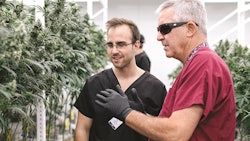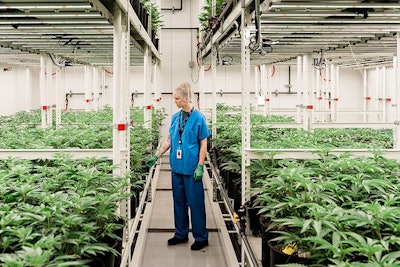

On April 24, Green Peak Innovations CEO Jeff Radway stood on the steps of the Michigan State Capitol in Lansing and said, “Enough is enough.”
Behind him perched a line of fellow MI Clean Cannabis advocates holding a large sign that proclaimed: “Clean, safe marijuana is what we voted for.” MI Clean Cannabis (read: “My Clean Cannabis”) is a statewide campaign that Green Peak Innovations solely funded in early 2019 to reform Michigan’s medical cannabis law. The seed-to-sale compliance structure that lawmakers approved in 2016 had swerved off-course, the campaign alleged, pointing to how the state’s Department of Licensing and Regulatory Affairs (LARA) recalled untested products from store shelves in January and February. It turned out that caregiver-sourced flower was turning up with alarming levels of arsenic, cadmium and residual solvents.
“Enough is enough” became the rallying cry of a regulated market trying to find its place in a state that had left open the door to unlicensed growers.
Radway, at the helm of one of the largest licensed cannabis companies in the state, looked out at a crowd of about 100 supporters cheering him on. Another dozen or so protesters held up the back of the throng and booed loudly. In Michigan—a state caught between a gray-market medical cannabis landscape first greenlit in 2008 and a voter-approved adult-use market awaiting consumers in 2020—things are complicated.
To ameliorate the slow, rocky transition from a loosely regulated medical cannabis market into one that’s as tightly regulated as neighboring Ohio or Illinois, in January, Michigan allowed caregivers to sell untested product to licensed dispensaries. The reason? Patients were reporting product shortages. Their needs were urgent.
Radway sees it differently. When first asked in February about this disparity between supply and demand, he told a group of reporters at Green Peak’s gleaming new cultivation facility in Windsor Township that his company was close to harvesting its second crop of cannabis—and not all of that second crop had been sold yet. “If the licensed legal provisioning centers needed product, they would be calling us to place orders,” he told the press scrum. “I’ll let you draw your own conclusions on that.”
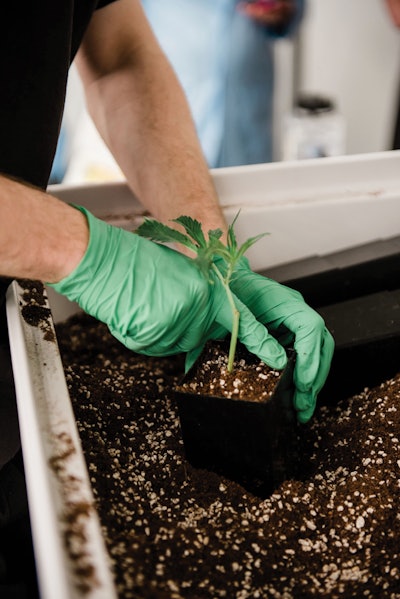
By April, the narrative had grown contentious.
The state had lapsed into what Radway calls a “suspended regulatory environment.” Bitterness stoked the competition between licensed and unlicensed growers. He and his company began funding MI Clean Cannabis. Billboards went up around the state as part of a $300,000 campaign spend. Full-page ads bloomed in the major dailies.
If the law was written to regulate a medical cannabis market, then that’s what the state should be doing, he argues.
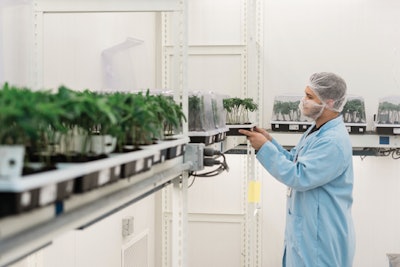
“We believe up to $100 million worth of product flooded into the state after Gov. [Gretchen] Whitmer issued an executive order [in January] to allow caregivers and temporary operators to continue operating through the end of March,” he tells Cannabis Business Times. In late March, at least six unlicensed business—caregivers and dispensaries—filed separate lawsuits to remain open and operational, as in Green Genie Inc. v. State of Michigan.
Amid a series of rulings on a number of grievances brought by those businesses, the judge initially sided with the caregivers, issuing a temporary restraining order and stopping the state from enacting its regulations. Green Peak Innovations and the other 24 licensed cultivators were stuck. They were competing with the unlicensed market’s lower prices, despite laying down heavy capital investments into a regulated business arena.
What that means is the subject of much debate in Michigan.
4th District Appeals Court Judge Stephen Borrello ruled on April 30 that the question of caregiver-sourced cannabis remains in the state’s hands. Making a quick decision, the Marijuana Regulatory Agency announced that licensed dispensaries could no longer buy cannabis products directly from caregivers. Those caregivers could, however, sell flower to licensed growers and processors—who must then test the finished products before funneling it into the retail market.
“We support the decision, as it follows the licensed supply chain but allows for supplemental product to enter the market—as long as it is tested,” Radway says. “With 300,000 patients, we understand the need to maintain access to products and are happy to see the state move in this direction.” As the state’s marketplace and supply chain gels, Radway’s vision comes into stark relief: He wants to position the company at the vanguard of the legal cannabis space.
But there’s something more: “We’ve upped the ante on ourselves,” Radway says. “We hope and expect to be one of the top cannabis companies in the U.S.”
In the late 1980s, while attending Michigan State University, Radway started a company with a business partner. They sold clothing, and they soon found themselves selling the business outright to a publicly traded company in 1992. They liked the growth, the sense of building toward something. So, they started another company that same year, eventually erecting a global supply chain and landing their team-licensed apparel in stores like Nordstrom and Walmart. They managed more than 400 brands, including the Ohio State University’s athletics department—“the No. 1 NCAA brand in the world,” Radway says. It had been a fulfilling run.
Radway was looking forward to retirement in early 2016. He had been in the apparel business for 30 years and was excited about the prospect of relaxing a bit. He and his wife had been talking about what might come next. Maybe a house in the Caribbean?
And so, when Radway found himself at his final apparel trade show in Las Vegas in 2016, on the eve of a new chapter in his life, he was just about ready to clock out for good.
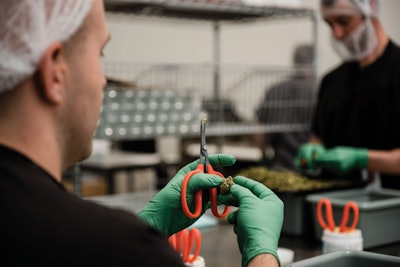
But his Uber was running late.
Radway started daydreaming about the future. “Man, I can’t wait to never go to another trade show again,” he recollects now. “I’m building a house in the Caribbean with my wife. I’m going to retire for a few years. And when I come back and check in on the business world, I wonder if Uber’s going to deliver my dry cleaning, and I wonder if they’re going to deliver food; this was before Uber Eats [had expanded nationally]. And I thought, ‘Why don’t they deliver cannabis?’”
Half-joking, he texted his nephew, Joe Neller, who was working as a lobbyist and governmental affairs expert back home. Neller got back to him with a more clinical response than Radway expected: “He said something like, ‘I’m working with some of the groups in the state of Michigan on the new medical marijuana regulatory structure. We’re helping to move it through the House and Senate.” He offered to put his uncle in touch with the stakeholders who were bringing this new industry to light.
The two talked for the next several hours, and Radway felt the torque of business rhetoric guide him around an unexpected bend in his life.
“‘Are we able to build out a vertical operator?’” Radway asked. “‘Can we enhance the customer experience?’” Neller said “yes” to those questions and more.

Later that year, in September 2016, then-Gov. Rick Snyder signed a trio of regulatory medical cannabis bills into law. “This new law will help Michiganders of all ages and with varying medical conditions access safe products to relieve their suffering,” Snyder said during the signing ceremony. “We can finally implement a solid framework that gives patients a safe source from which to purchase and utilize medical marijuana.”
Drawn to the appeal of a rapidly emerging and evolving cannabis market, Radway told his wife he wouldn’t be retiring—the Caribbean would still be there (probably)—and he began building a team. His nephew was quick to take on a role as executive vice president of government affairs and business development.
“Frankly,” Radway says, “I wanted one more shot at building a world-class company. The rest of the story is still playing out.”
Green Peak Innovations’ cultivation facility opened later that year on a light-industrial road in Lansing. The building now houses the company’s R&D space. Outside, a sign reads: Adlinger Marketing, a holdover from the commercial printer that once operated in the long, single-story building.
Radway says it took a 14,000-page application to get his business aligned to state standards. “It took a lot of capital,” he says. “Like everything in this industry, it takes a little more than what you thought. And what you thought was a big number to begin with.”
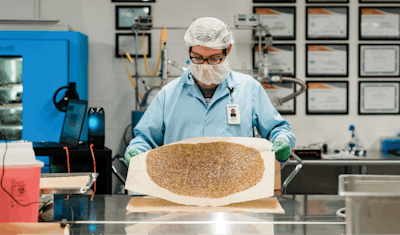
Then, in February 2019, Green Peak officially cut the ribbon on its new purpose-built cultivation facility in Windsor Township, Mich. The 60,000-square-foot Skymint-branded facility was the first tenant at the Harvest Park development, a 130-acre site just outside the southwest hemline of Lansing proper. The idea behind Harvest Park revolves entirely around the state’s cannabis industry: Green Peak’s status as the anchor tenant sent a clear message about where the company’s vision lay and where Michigan business leaders were placing their bets.
When Green Peak opened its Harvest Park location, it also formally launched its Skymint brand. This is the consumer-facing name that Green Peak will use at its planned 19 Skymint dispensaries (“provisioning centers” in Michigan regulatory parlance).
The building looms over a quiet road just off I-96 in Windsor Township. Empty parcels surround it, but already plans are in the works to fill that land with cannabis business and industry-adjacent enterprises, like a solar farm. Green Peak has broken ground on a 170,000-square-foot expansion on 40 acres just across the street. That comes with a 300-percent increase in production capacity, Radway says.
This is the path he and his team have charted toward their ultimate goal in Michigan—and beyond. (On May 13, for example, Green Peak announced its acquisition of “a company which holds a vertical cannabis license in Florida." As of press time, details remained confidential. The transaction is expected to close in the third quarter of 2019. In addition, on May 23, Green Peak announced the official launch of North Cannabis Company, which rolled out its Michigan-made flower, pre-rolls, wax and shatter to 10 dispensaries in the state, and plans to ship more products, including vape cartridges and gummies, soon.)
Inside the Skymint cultivation facility, Green Peak will maintain a perpetual harvest cycle. Across 22 flower rooms, the company intends to produce about 30,000 lbs. of cannabis each year and run each batch through its in-house testing lab before sending materials to a state-licensed lab. The perpetual harvest model is something that Radway sees as paramount in an increasingly competitive marketplace—especially once the state tightens its grip on its medical cannabis regulations. “We will have constant output for the patients and consumers of Michigan,” Radway says.
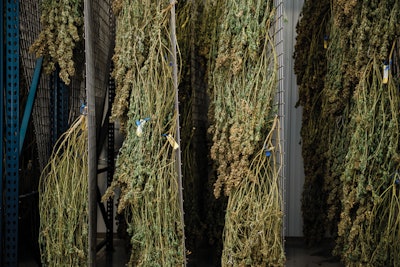
In early 2019, Green Peak kept its focus on wholesale, which is where the corporate frustration with Michigan’s “lapsed regulatory environment” came into play. In February, Green Peak shipped its first harvest to shelves at dozens of dispensaries in the state.
The wholesale market is where Green Peak intends to learn lessons and experiment in the run-up to the company opening its Skymint stores in Michigan. (Radway is planning to see 14 open by year’s end.) Because Michigan’s medical cannabis market flew under the regulatory radar for most of the past 10 years, very little supply-and-demand data existed for Radway and his team to study when they were selecting genetics and planning a product line.
“So, we started fresh [from a mix of seeds and clones] in October,” Radway says. “We’re still vetting genetics. We’re learning what the various strains like. We’re learning how they respond to different nutrients. Our R&D department is fast at work: learning about their nutrient profiles, learning about the different climates, and frankly, assessing chemical and cannabinoid profiles so that we ultimately deliver the best product—and also product that our customers like. That takes time.”
He returns to a refrain: “Let’s not lose sight of the fact that this is medicine.”
The genetics work seems to be paying off, as Skymint’s YEM OG and Sour Lemon Diesel have found early success among patients. “All of our strains are grown in precise environments to maximize their potential,” Radway says. “Our cultivation team is a mixture of growers with experience in other legal states and experienced caregivers from Michigan. Our COO [Adrian Almeida] comes from one of the largest indoor tomato companies in the world [Nature Sweet], and he is leveraging his experience with data and technology with the broad cannabis-growing experience of our staff to create the most repeatable and consistent product.”
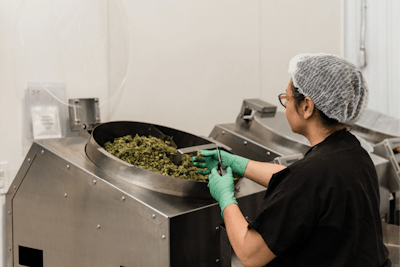
What Radway took from the earlier chapters of his career is a drive to develop the right team. He’s spent most of his life in the apparel business, but solid business principles remain applicable even in the seismic churn of the burgeoning U.S. cannabis space.
“The answer is always the same,” Radway says. “It starts with great people.”
That was the seed of the whole operation. When Radway and Neller co-founded Green Peak Innovations, the vision that guided them was hiring people who are both passionate about what they do and imbued with that entrepreneurial flame. “They have to bring real business background and real success to the table,” he says. “They’ve got to be team players. And, you know, in the cannabis space, you have to expect the unexpected and have sort of a built-in flexibility to everything that you do. Things change very quickly, sometimes on a dime, in this industry.”
As of press time, Green Peak employs more than 170 people and is “hiring at a brisk pace,” Radway says. The company is committed to having 200 employees on-site in the current Skymint build-out, with another 100 set to be hired as part of the Harvest Park extension. By the end of the year, Radway envisions a total corporate headcount close to 600—as Skymint provisioning centers open across the state. By the end of 2020, with a planned doubling of the company’s capacity to meet the demands of the adult-use market and even more provisioning centers opening, he says Green Peak “will be well north of 1,000 team members.”
As that corporate growth rate picks up speed, Green Peak includes its employees in profit-sharing bonuses. Right now, all top managers own a piece of the company, and Green Peak is “in the process of creating a pathway to ownership for all of our employees,” Radway says.
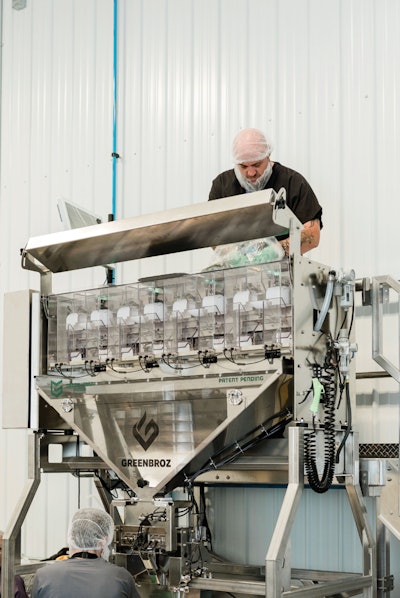
To get there, Radway is focused on each day and the incremental progress required to develop a licensed marketplace in a burgeoning industry.
The goal of standing on the steps of the Michigan State Capitol on April 24, Radway says now, was to raise awareness among patients of what’s working and what’s not with the implementation of the state’s medical cannabis law.
“We’ve held ourselves out since day one as leaders in the market,” Radway says. “We felt like we had to do the heavy lifting in the state. We had to carry the industry forward. And it’s not always fun to pay the bills for that type of an effort, but what needs to be done is not always fun or exciting. It still needs to be done.
“It’s up to the lawmakers and the regulators and the judge, for that matter, to do their jobs,” Radway adds, “and require the businesses in the state of Michigan to follow their regulations.”
Shortly after Judge Borrello issued his ruling and the Michigan regulatory agency updated its rules for caregivers, several state lawmakers introduced a bill that would assert yet another deadline: By June 1, according to the legislation, caregiver-sourced cannabis would no longer be permitted in the legal marketplace in any form—tested or untested.

Wherever that bill ends up, Radway will be at the Harvest Park office. He’ll be watching how patients engage in these early days of the licensed medical cannabis market in Michigan. He’ll be working alongside his team to prepare branded products off the data provided by those early sales.
“It’s going to take well over a year—and maybe even a year and a half—to dial in the science, collect all the data, and then course-adjust to what consumers really prefer,” he says.
Ultimately, that’s what Green Peak wants to offer: “products that our customers love and ... can rely on.”









